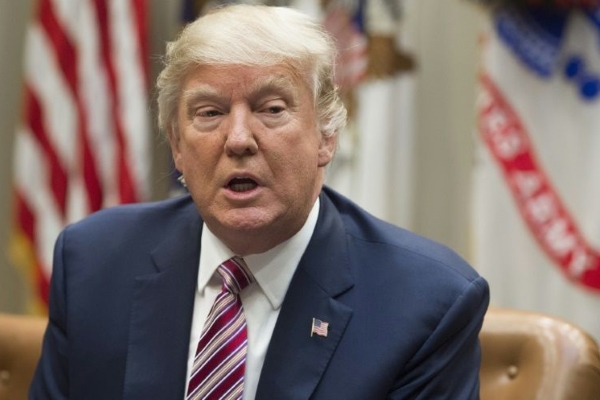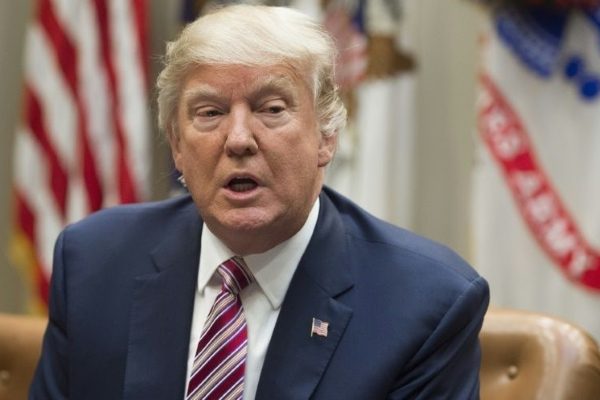
By: Josh Wood
Source: Middle East Eye
BOSTON, United States – On Donald Trump’s re-election campaign website, the “Listening to America 2018” survey asks for opinions on hot button issues facing the country.
Predictably for a divided America, much of its language is loaded and many of the questions are leading. But the issues covered are mostly real concerns that many people in the United States have: things like abortion, how to prevent school shootings, how to strengthen the economy and what to do about illegal immigration.
Then there’s question 27: “Are you concerned by the potential spread of Sharia Law?”
Conspiracy theories that Sharia law is creeping its way into power in America have been around for years, swirling among the most conservative fringes of American politics. Once the realm of paranoid and bigoted grassroots organisations, they eventually found their way into state legislatures as bills trying to ban the implementation of Sharia law.
But today, with Trump as president, they have worked their way up to the highest levels of power in the country, giving them more exposure – and perceived credence among conservatives – than ever before.
“What was once fringe has now become mainstream,” said Wajahat Ali, the lead author of a 2011 Center for American Progress report on the origins of the anti-Islam lobby in the US. “You can trace it to a small, incestuous network of what were once considered far-right anti-Muslim bigots who have now made their way to the White House and whose memes and talking points are now taken seriously by the Republican Party.”
Sharia is a set of principles that observant Muslims live by, similar to religious laws that members of Christian sects and Judaism follow. But anti-Sharia campaigners do not paint it as a personal set of religious values; rather, they portray it as an oppressive legal, political and military doctrine that seeks to dominate the US, subjugate non-Muslims and usurp the Constitution as the law of the land.
Sharia conspiracy theories vary in intensity, but none take into account the sheer impossibility of imposing strict Islamic laws on either a local, state or federal level in the US. But experts charge that the anti-Sharia lobby cares little about how realistic the threat is. Instead, they say they are in it for votes and power, exploiting fears of Muslims in the US.
“It’s gradually getting infused into the larger Republican party platform. And the reason they’re doing it is because it works,” said Todd Green, an associate professor of religion at Luther College in Iowa who studies Islamophobia in the US and Europe.
“It’s not about objective information about something called Sharia, or whether there’s actually any kind of threat one percent of the population poses to the entire country, or to the state of Oklahoma or Texas, or wherever these laws are being passed: it’s about tapping into already existing fears and angers in a certain segment of the population of the electorate and galvanising that and channelling it into votes. And it works.”
An administration of Islamophobes
Trump has mentioned Sharia law several times during his political career. Campaigning for the presidency, he blamed terror attacks in Europe on populations not assimilating to their countries because “they want Sharia”. He also said that under his administration, the US would not give visas to anybody who believes Sharia should supplant US law.
But he is better known for his broader attacks on Islam: as a candidate he said he was open to closing mosques to help fight terrorism, suggested creating a database of Muslims in the US and called for a “total and complete shutdown of Muslims entering the United States”. At one point, he said: “I think Islam hates us.”
Beyond the president’s own Islamophobic statements, he has surrounded himself with current and former officials who have pushed Sharia conspiracy theories, many of whom have had ties with anti-Muslim organisations considered hate groups by the Southern Poverty Law Center. The list is long:
Kellyanne Conway, one of the president’s closest advisers, once conducted a poll for an anti-Muslim group that was largely derided as unscientific and claimed more than half of Muslims living in the US supported Sharia law.
Stephen Miller, another top White House adviser, once warned about rising “Islamofascism” when he was a college student; and Ben Carson, the secretary of housing and urban development, said he would only support a Muslim president if they renounced “the central tenant of Islam: Sharia law”. CIA director Mike Pompeo co-sponsored a bill to ban the Muslim Brotherhood.
Trump’s long list of former White House officials also heavily echoed so-called threats of Sharia law. His former chief of staff, Steve Bannon, presided over Breitbart News, a website that pandered to the far-right and regularly published articles warning of the spread of Sharia law in the US and Europe; and Michael Flynn, Trump’s short-lived national security adviser, described “Islamism” as “a vicious cancer inside the body of 1.7 billion people” that “has to be excised”.
Dangers real for Muslims
Experts say the migration of Sharia conspiracy theories – and other Islamophobic elements that go hand in hand with them – from the fringes of the Republican Party to its core, are dangerous for Muslims in America.
“This is a kind of rhetoric that is really meant to do harm to Muslims in order for politicians to make political gain, or for anti-Muslim hate groups to also have political influence, or have financial gain arise from this,” said Green, the Luther College professor.
“The Trump administration and other Republican politicians – at least in certain areas – are doubling down on it because so far it has been a winning strategy. And they will continue to do that until it is challenged in a significant way,” he added.
The rise of anti-Muslim rhetoric is already having consequences. The campaign season of 2015 and 2016 saw a surge in hate crimes against Muslims in the country, according to the FBI. In 2016, there were even more hate crimes against Muslims than in 2001 when anti-Muslim sentiments seethed in the aftermath of the September 11 attacks.
As anti-Muslim and anti-Sharia voices have gained prominence, the push to bring Sharia bans into state legislatures have also increased.
To Ali, the lead author of the Islamophobia report, the threat is not just to Muslims, but to American values.
“If we are unable or unwilling to integrate Muslims and accept Muslims and people of colour as parts of the American fabric, what we will see is the American dream turned into the American nightmare,” he said.
“These forces that are preying upon anti-Muslim bigotry and Islamophobia, they threaten to corrupt and bring down America for the rest of us. That’s why this issue of Islamophobia is not just an Islamic problem, it’s an American problem.”
The views expressed in this article do not necessarily reflect those of MuslimVillage.com.




